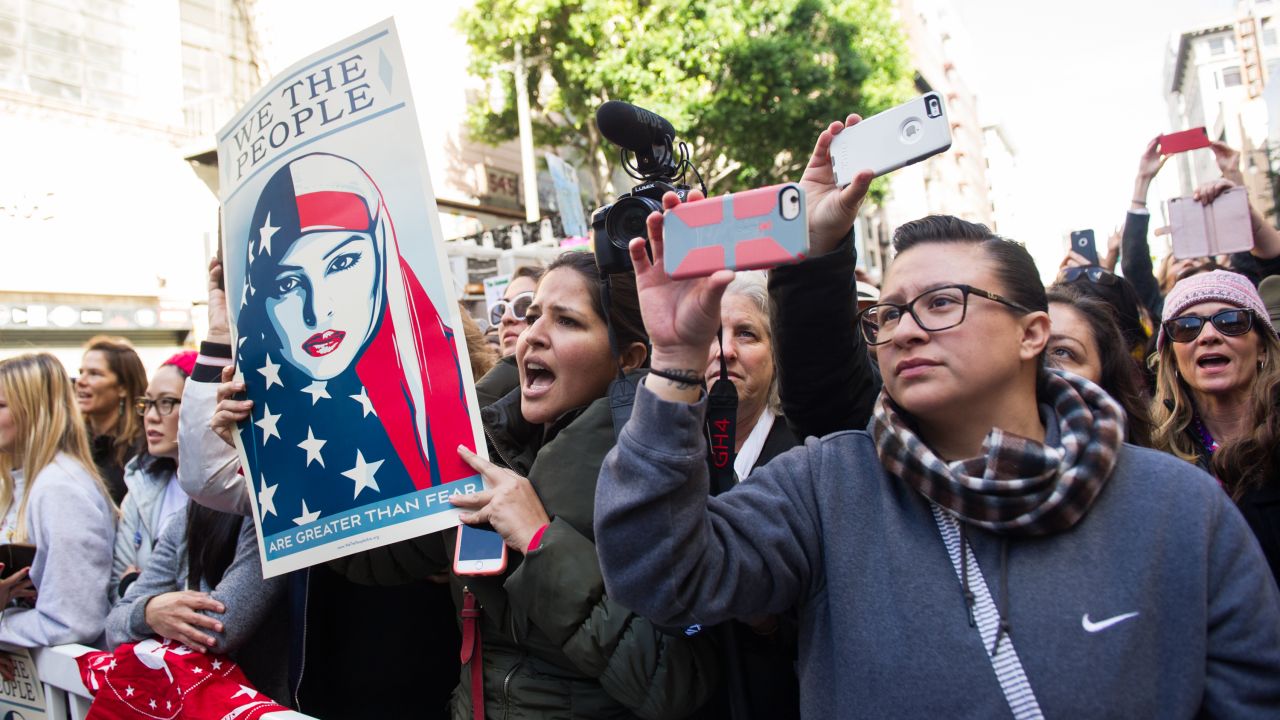
A view of the crowd at the women's march in Los Angeles on Jan. 21, 2017 in Los Angeles. (Photo by Emma McIntyre/Getty Images)
This post originally appeared at Counterpunch.
On Saturday, Jan. 21, I joined somewhere between 300,000 and 500,000 people in downtown Los Angeles as the city made its own unique contribution to the women’s marches galvanizing more than a million people across the US and around the world. In LA, as elsewhere, activists fighting for a wide range of causes — from reproductive rights to Black Lives Matter, from climate change to workers’ rights — came together in a powerful display of unity. That is why, as organizers met after the march to maintain a unified momentum, I found it somewhat disconcerting to read Oregon Sen. Jeff Markley’s statement that, “Trump is the cure here; he brings everybody together.” Yes, it is true that Trump’s persona and actions have had a great deal to do with energizing and mobilizing the protests, and it is certain that he will continue to inspire resistance as he seeks to realize his agenda.
Yet in the long term, Trump can hardly sustain a movement as a “cure” or unifier. Something much deeper has to be involved, and that something is nothing less than the reclamation of our democracy and the democratic promise of the American experiment.
In saying this, I don’t use the term democracy simply to refer to the formal institutions of representative government, nor to such practices as voting, nor even to the norms and unwritten rules that maintain the rule of law and the peaceful transition of power. Important as these elements are, they lack meaning without the presence of a living culture of democracy, a body of understandings and habits that bind us to one another in mutual responsibility and to a commitment to human equality and freedom. This is the vision of democracy powerfully expressed by political scientist Danielle Allen in her recent book, Our Declaration: A Reading of the Declaration of Independence in Defense of Equality. This is a vision affirming that we are all not only entitled to the “unalienable rights to life, liberty and the pursuit of happiness,” but also to equality of access to government as the tool by which we secure those rights.
There is a direct line of inheritance from the Declaration’s writers to the marchers who crowded the streets of American cities on Jan. 21. The writers who generated the Declaration of Independence did not compile their grievances against King George III by brainstorming their complaints in closed session, but by placing advertisements in newspapers across the country. They relied on what Allen called the “collective intelligence” of ordinary citizens to build their argument for independence. As Allen said, “In developing their list of complaints against King George and in coming to understand their situation, the colonists became the free people capable of self-government that, with their declaration, they asserted themselves to be.” In other words, they were developing the habits of freedom even before the nation became formally independent. They reinforced this process by drafting constitutions for the future states even before signing the Declaration of Independence on July 4, 1776.
By the same token, the marchers of Jan. 21, 2017 didn’t wait for a midterm election to enact a vision of what democracy is and can be. Despite the oligarchic, authoritarian nature of the Trump candidacy and presidency, the marchers moved boldly to reclaim their democratic heritage by reinterpreting it in the light of contemporary circumstances. The marchers I know understood that today the phrase, “life, liberty and the pursuit of happiness” incorporates the unalienable right to decent, affordable health care. They equally understood that this powerful phrase includes the unalienable right to a healthful environment — and the right to counter powerful economic interests that elevate short-term profit above the well-being of all.
Moreover, the marchers I know understand that reclaiming democracy necessitates coming to terms with the tragic distortions and exclusions coiled within the DNA of the young American republic. They know that reclaiming democracy means coming to terms with the legacies of slavery, genocide and racism, and that democracy must now mean full inclusion of all people within the American polity. That is why, ultimately, we don’t need a Trump as a “cure” or unifier. Certainly, resistance will and must continue. But it is democracy itself that is the unifier. The issues represented in the marches — Black Lives Matter, immigrants’ rights, Standing Rock, reproductive rights, among others — are all deeply connected by the sacredness and dignity of human life, and by the right to life, liberty and the pursuit of happiness for this generation and all generations to come.
At one point in the LA march, I looked up in the blue, cloudless sky and saw a lone airplane trailing a banner proclaiming, “Congratulations President Trump on Your Inaugural.” A young woman standing next to me noticed my glance and said, looking up at the plane as well, “That looks like one of Trump’s tweets. But there’s just one of him, and there’s all of us.” Looking down Hill Street at some of the hundreds of thousands of people that day, and perhaps with King George III in the back of my mind, I knew she was right.




